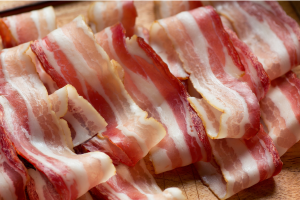Mazal tov on keeping kosher and great question!
The 12th century sage, Maimonides, discusses the prohibition of consuming non-kosher foods. He quotes the Midrash which states, “One should not say, ‘I don’t want to eat non-kosher food,’ rather one should say, ‘I would like to, but what can I do, my Father in Heaven has decreed upon me’.”
Maimonidies explains that this is a global statement which sums up much of the Jewish worldview, and specifically adds an important insight into the laws of kosher. We should not refrain from consuming non-kosher food because it is disgusting or nauseating to us. To abstain from non-kosher items for that reason would not constitute a mitzvah. It would rather be a personal preference (I, personally, am challenged to fulfill this dictum concerning the abstention from consuming certain items, such as lobster, by saying I want to eat it but just can’t. When I see them crawling around in their tank, to say the least, I have trouble having any yearning whatsoever to …eat one of those!).
The Talmud cites many stories of a pious and scholarly woman by the name of Yalsa. She would often seek out kosher foods that tasted like forbidden foods. Yalsa once asked her husband, the renowned sage Rav Nachman, to find her something which tastes like blood which the Torah forbids us to partake. He cooked for her a piece of liver, which is permitted, but has a blood-like taste. The commentaries are bewildered: Why did she do this?
One classical commentary, the Maharsha, offers an explanation based on the above discussion of Maimonidies. One should desire to eat the non-kosher, but refrain from doing so because of the decree of the Torah. Yalsa, in her great piety, aspired to fulfill the mitzvah of kosher only to perform the will of G-d. She therefore purposely created a yearning to consume forbidden foods by partaking in permitted items which tasted like them, in order to refrain from them because of the mitzvah. Fascinating!
My family and I once took a tour of a non-kosher chocolate factory and at the end they offered a free taste of all the chocolates you can eat. I felt that we truly fulfilled the mitzvah by refraining when that chocolate looked and smelled so good! (Needless to say, we were sure to make it up to the kids for their willpower by rewarding them afterwards with other treats.)
In summary, you are correct that there is nothing negative about eating imitation non-kosher food. By doing so, besides enjoying the taste, you have the opportunity to follow in the footsteps of Yalsa and enhance your fulfillment of the mitzvah of kashruth. Not only is this not contradictory to the spirit of the law, it’s a chance to augment your performance of the mitzvah.
I fondly remember your exact question as one of the first questions I asked my mentor when beginning Yeshiva studies in Israel, precisely about Morning Star bacon and sausage, and what we explained aboved, (in greatly shortened form), was the answer I received.
It’s important to mention one caveat to this concept. Maimonides points out that the desire to eat the “forbidden fruit” is considered a positive thing for certain mitzvos, like kosher, but not for all. There is a category of mitzvos which God has inculcated their self-evident nature into the creation, such as murder. It is definitely not praiseworthy to say “I would truly love to murder that guy, but, alas, I must fulfill the command of G-d!” (Even though we all might feel that way sometimes). Murder, theft, and other such mitzvos are called “mitzvos sichlios.” planted in our sechel or psyche, that they should be abhorred and not desired.
Sincerely,
Rabbi Yerachmiel Fried


